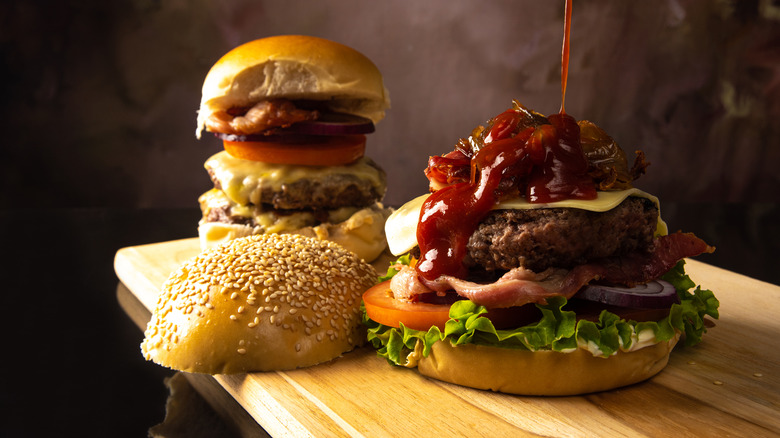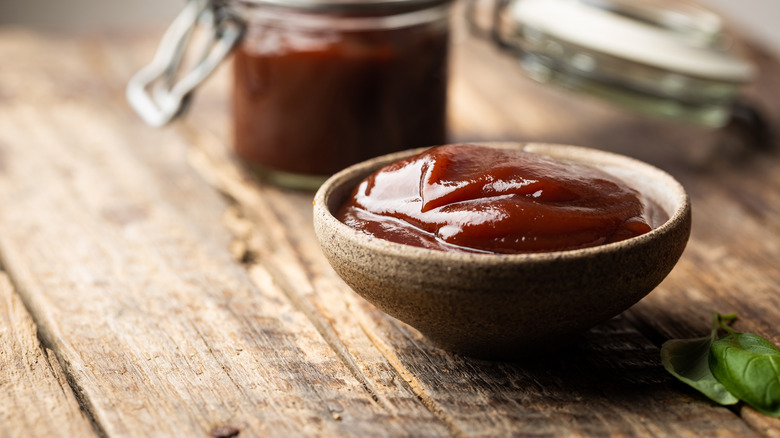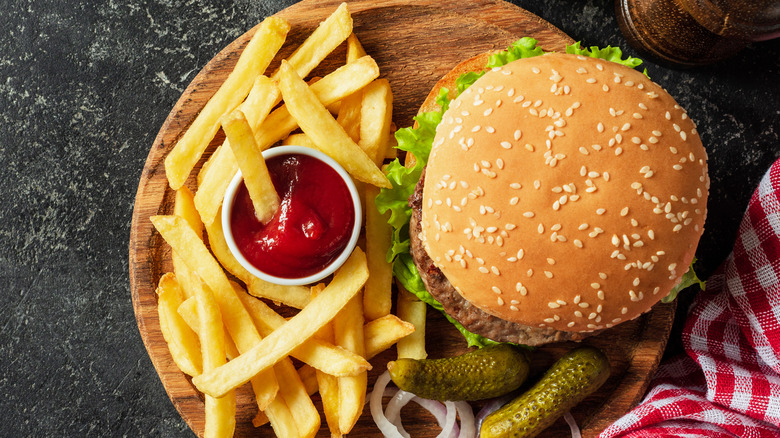Smoked Ketchup Is The Condiment Your Burgers Need This Summer
While you might enjoy mayo in your potato salad or a simple chimichurri on steak, there may be no condiment more synonymous with summer barbecues than classic tomato ketchup. When grilling season is at its peak and burgers, French fries, and hot dogs are always on the menu, you'll be hard-pressed to have enough ketchup on hand — but while its tangy-sweet flavor is perfect for kids, some grown-ups might find it a bit one-note.
To make ketchup a more sophisticated (and delicious) spread, it's time to try smoking it. There's a reason why you often see tomatoes paired with smoky ingredients like paprika, chipotle peppers, or the spices in basic barbecue sauces: The sweet-tart tang of the fruit and the rich woodsy taste of smoke are ideal flavor partners. It might sound odd at first, but infusing your ketchup with a campfire flavor is easy to do, and adds a ton of complexity to this all-star ingredient.
Smoked ketchup will complement the char of the beef patties that come off your grill, giving simple burgers a major upgrade with little extra effort. There are a few ways to add smokiness to the condiment, from using various appliances to mixing in ingredients that mimic a bit of time in the smoker.
How to infuse your ketchup with smoky flavor
You can start with standard store-bought ketchup or make your own as a base for a smoky makeover. The most straightforward method is to use a smoker, if you happen to have one. Just keep in mind that over a longer cooking time, your ketchup may reduce into a more thick finished product; if the consistency isn't to your liking, just stir in a bit of water.
If you don't have a smoker, a smoking gun is a handy tool that saves space on a full smoker setup, while delivering similar results. This tool also adds flavor quicker, reducing prep time from a few hours to mere minutes. Although you may not achieve the exact same depth of flavor, your ketchup should still be noticeably smoky and savory.
When you lack actual smoking tools, there are a handful of other ways to infuse a campfire aroma into ketchup. Adding liquid smoke is one option, though it can be quite potent, so start with just a drop or two for every 1 ½ to 2 cups of ketchup. And with the help of liquid smoke, a microwave can smoke ingredients like salt, so you could try nuking your ketchup afterward for a more concentrated taste. If you're making the condiment from scratch, you can even add a smoky lager or ale to make a beer ketchup, which brings a touch of bitterness to your spread, too.
Personalizing your smoky ketchup
If you find that you love the taste of your upgraded ketchup, try customizing it even more to your liking. With a smoker, using various types of wood can have big impact on the taste. Mild fruit woods like apple and cherry are a good way to test your smoke tolerance. Maple and alder woods are on the sweeter side, while something like mesquite is quite assertive, so choose wisely based on how much sharpness you want to add.
After you learn how to make ketchup, you can incorporate ingredients that work well with the flavor of smoke. Try swapping using maple syrup, honey, or molasses as sweeteners, all of which pair well with a piquant smokiness. Spices like cumin, curry, garlic, and hot peppers up the savoriness (even better if any of these are mixed into your burger patties). Roasted red peppers or even cranberries play up the fruity and vegetal notes of the ketchup.
To experiment with the base, try using smoked tomatoes. These are already a game-changing smoky ingredient for pasta sauce, so they'll work just as well for other tomato sauces. Just be sure to add smoke a little bit at a time, as too much can come across as bitter. If you go overboard, adjust your ketchup by adding some sugar or vinegar. Once you find the right balance, smoked ketchup will be a staple on your summer table, and guests will wonder why your burgers are so tasty.


